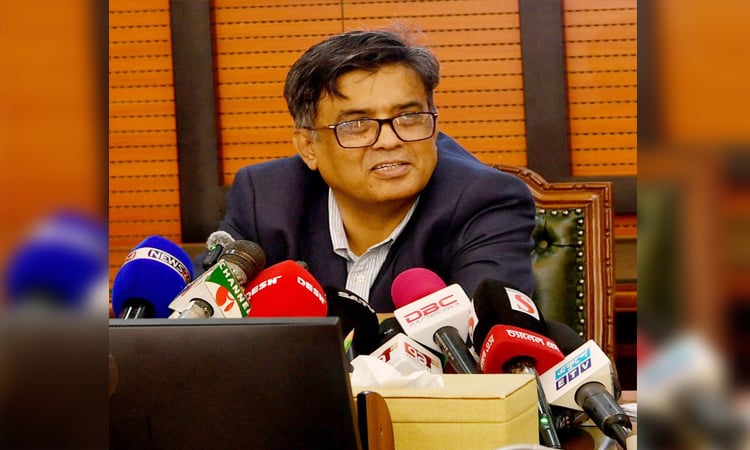News Flash

DHAKA, Sept 13, 2025 (BSS) – Journalists have demanded reviewing Media Reform Commission’s recommendations to ensure protection, rights, and professional security of journalists.
They also suggested implementing “No Wage Board, No Media” policy, setting a minimum monthly salary of Tk 35,000, and ensuring the implementation of wage board benefits for both print and electronic media.
They made the demand at a roundtable discussion titled “Reviewing the Recommendations of the Media Reform Commission and the Way Forward”, jointly organized by Dhaka Reporters Unity (DRU) and the Journalist Community of Bangladesh at the Shafiqul Kabir Auditorium of DRU.
With DRU President Abu Saleh Akon in the chair, Chief Adviser’s Press Secretary Shafiqul Alam addressed the event as the chief guest while Journalist Community of Bangladesh Member Secretary Md. Mia Hossain presented the keynote speech.
Moderated by DRU General Secretary Mainul Hasan Sohel, the discussion was addressed by Bangladesh Journalists Welfare Trust Managing Director M Abdullah, Bangladesh Federal Union of Journalists (BFUJ) President Obaidur Rahman Shaheen, former DRU President Sakhawat Hossain Badsha, DBC News Editor Ekramul Haque Bhuiyan (Loton Ekram), Dhaka Mail Executive Editor Harun Jamil, and former DRU President Rafiqul Islam Azad.
Chief Adviser’s Press Secretary Shafiqul Alam said the commission’s report contained many good recommendations but also inconsistencies that required criticism.
He argued that the provision on “hurting religious sentiments” should remain, as religious violence often erupted in the country, and such safeguards were needed to prevent unrest.
Alam agreed with “No Wage Board, No Media” policy saying, “It needs to be implemented.
He proposed that media outlets have to deposit security funds into the government’s welfare trust for journalists Tk10–15 crore for online media, Tk 20 crore for newspapers, and Tk20–25 crore for television channels. This fund, he suggested, would help pay journalists’ salaries during crises.
“The editors who take ownership positions should resign from unions, as this created conflicts of interest,” he said.
He stressed the need for certification of journalists, citing the rise of “pseudo-journalism” and unethical reporting. Employers, he added, must bear responsibility for ensuring workplace safety for journalists, with provisions for legal action against them if needed.
With support from international fintech company Nala, the event was also addressed by former DRU General Secretary Motahar Hossain Masum, Moshiur Rahman Khan, DRU Vice-President Gazi Anwar, Nala’s Head of Growth Mahmudur Hasan, DUJ Joint Secretary Didarul Alam, and senior journalist Hafizul Islam.
DRU President Abu Saleh Akon said reforms would be meaningless without unity among journalists.
“We must organize ourselves to secure our rights,” he said, pointing out that despite political changes, structural reforms in the media had not materialized yet,” he added.
M Abdullah urged the government to formally recognize organizations like DRU, the Press Club, and others alongside unions, and to bring veteran journalists under pension schemes.
Obaidur Rahman Shaheen alleged that the report lacked transparency and accuracy, necessitating a review.
Mainul Hasan Sohel said journalists directly involved with political parties should not ethically present themselves as journalists.
Sakhawat Hossain Badsha said without DRU’s representation in media-related commissions, genuine reforms would not be possible. He also stressed the need for a strong Journalist Protection Law.
Rafiqul Islam Azad said journalism as a profession was under threat and journalists must confront the crisis with resilience.
Speakers also demanded the establishment of a dedicated hospital for journalists’ healthcare.
Moshiur Rahman Khan noted that while the number of media outlets had grown, successive governments had done little to ensure journalists’ welfare, with owners investing mainly to protect their own capital.
Loton Ekram stressed the need to bring TV and online platforms under the wage board system.
Didarul Alam focused on the absence of a structured pay scale for journalists, urging measures to address their precarious conditions. He also pointed out that the Appellate Division had ruled that income tax of journalists should be borne by employers, a directive that needed enforcement.
Besides, Didar called for detailed provisions in the commission’s recommendations regarding salaries of district and rural journalists.